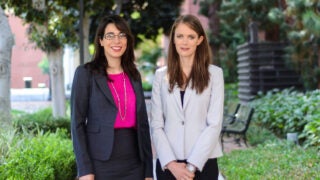Pinning tradition celebrates the incoming Trojans and the powerful legacy of achievement and advancement at USC.
News Listing
The novel approach combines transplanted human stem cells with a special protein that the U.S. Food and Drug Administration already approved for clinical studies in new stroke patients.
Students from USC and Africa teach youngsters about gender roles, hygiene and soccer.
Nora Ayanian and Kelly Sanders are recognized by MIT Technology Review for their promising studies of robotics and energy.
Trojan Marching Band and the Song Girls join rally, march to Galen Center for Residential College Cup introduction.
All told, about 20 percent of the university’s undergraduates, including the student body president, are first generation. Most are supported by some form of financial aid.
USC’s Dan Schnur writes that both candidates seem to be reaching out to undecided voters by attempting to Photoshop the most unfavorably viewed aspects of their respective personalities.
USC’s Dana Goldman writes that concierge medicine, where patients pay for perks like no-wait office visits, allows hospitals to charge wealthy patients more. The profits can be used to finance unprofitable activities such as charitable care.
The university remains the leader among U.S. schools for most all-time medals and gold medals, and continues its streak of having won a gold medal at every Summer Olympics since 1912.
A human protein combined with stem cell therapy has been found to repair stroke damage to the brain, according to a new USC-led study on mice.




